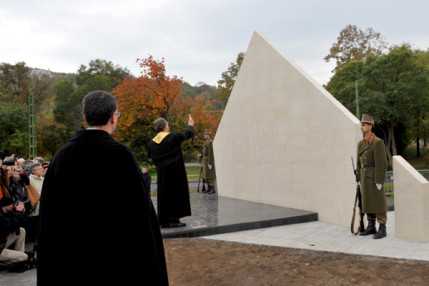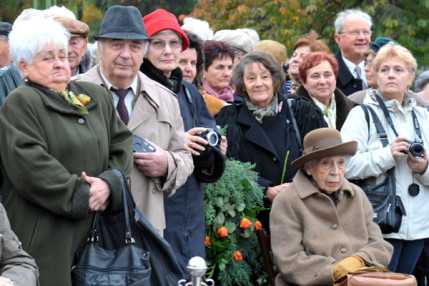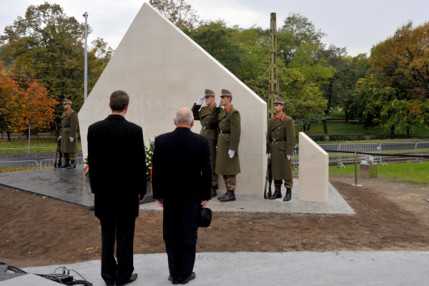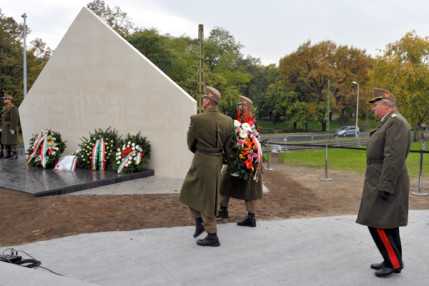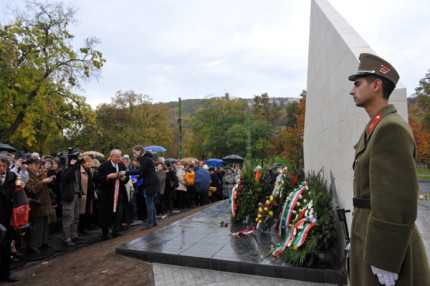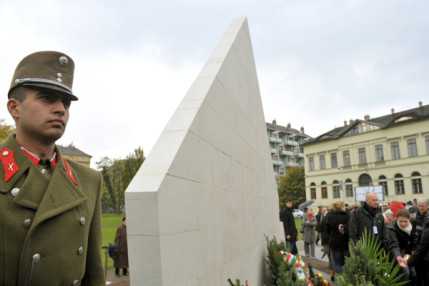Faith in the Family, Faith in the Homeland
Szöveg: Demeter Ferenc | 2010. október 24. 18:51In the afternoon of October 24 a memorial was unveiled in Budapest as a tribute to the victims carried off to forced labor camps and the internally displaced persons (IDPs) transported from the capital. Several hundred people participated in the event, including those who suffered the hardships during their childhood. MoD Administrative State Secretary Lajos Fodor also attended the ceremony.
Péter Eötvös, the president of the Association of IDPs of the Hortobágy Forced Labor Camps delivered a welcome speech at the event which was held in connection with the commemorations of the 1956 Revolution. He pointed out that the memorial is a tribute to the around 10,000 persons who had been displaced to Hortobágy and the 15,000+ Hungarians transported from Budapest, adding that the families were suffering in 12 forced labor camps where young and old alike had been struggling for survival.
In her speech, writer and sculptor Ms. Kinga Széchenyi, who was among the displaced persons as a child, referred to the Litracon material of the monument which radiates power and light.
‘Let this memorial serve as a memento to future generations so that such unlawful atrocities can never recur’, she said, adding in conclusion that these men have never been rehabilitated, not even during the years after the 1989 change of regime.
In his ceremonial speech MoD Administrative State Secretary Lajos Fodor noted that the displacement had ruined the life of several thousand persons who cannot be compensated for the lost years, but nowadays they can remember the horrors of the era at this memorial. The State Secretary added that the most horrible aspect of those events had been the fact that instead of foreign enemies, it was some Hungarians who inflicted harm on their compatriots.
Lajos Fodor went on saying that the policy of persecution in that era had not spared the contemporary armed forces either, so that career officers and NCOs were dismissed from their posts one after another. The leaders of the age did not need their patriotism, as they were only interested in the troops’ commitment to communism while working towards building up an internationalist army in the service of foreign interests, the State Secretary added. Today the military is here with us, but these days it means our own armed forces whose primary task consists in defending and protecting the citizens of our nation.
‘The Hungarian Defence Forces have proved this through their determination during the summer flood relief efforts and the recent industrial disaster causing a toxic sludge spill. We need small-scale armed forces with state-of-the-art weaponry that are ready to fulfill Hungary’s commitments in NATO’, Lajos Fodor said, adding in conclusion that ‘We, soldiers are obliged to commemorate those who fought World War II all along with honor and then were destined to live the rest of their life as demoted second-rate citizens. We must remember and remind people of their so many wasted years. We cannot forget, so we will never forgive!’
Bence Rétvári, State Secretary of the Ministry of Public Administration and Justice delivered an inauguration address at the ceremony, stressing that by unveiling this statue the Hungarian society has reached a landmark in the process starting with the 1989 change of regime, because so far these people had no memorial of their own. ‘Today they can bring their grandchildren here and tell them they were fighting for a just cause’, the State Secretary said, adding that in the contemporary system of national cooperation everyone can feel they are not alone in Hungary. It is only a strong middle class working for the homeland – one which would have been subject to intimidation in the 1950s – that can solve the problems of everyday life.
‘What was able to save those displaced to the Hortobágy camps?’, the State Secretary asked, answering that it must have been their faith in their families and the homeland. ‘You can overcome the difficulties only if you are setting yourself some goals that point beyond yourself and if you want to have an impact on other people’s lives besides your own’, Bence Rétvári said.
Following the unveiling ceremony the representatives of the established churches gave blessings and consecrated the statue. The event finished with people laying flowers and wreaths at the memorial and the sounds of the Szózat (second national anthem).
Click on our gallery for more pictures!
Text: Ferenc Demeter
Photo: Tünde Rácz
